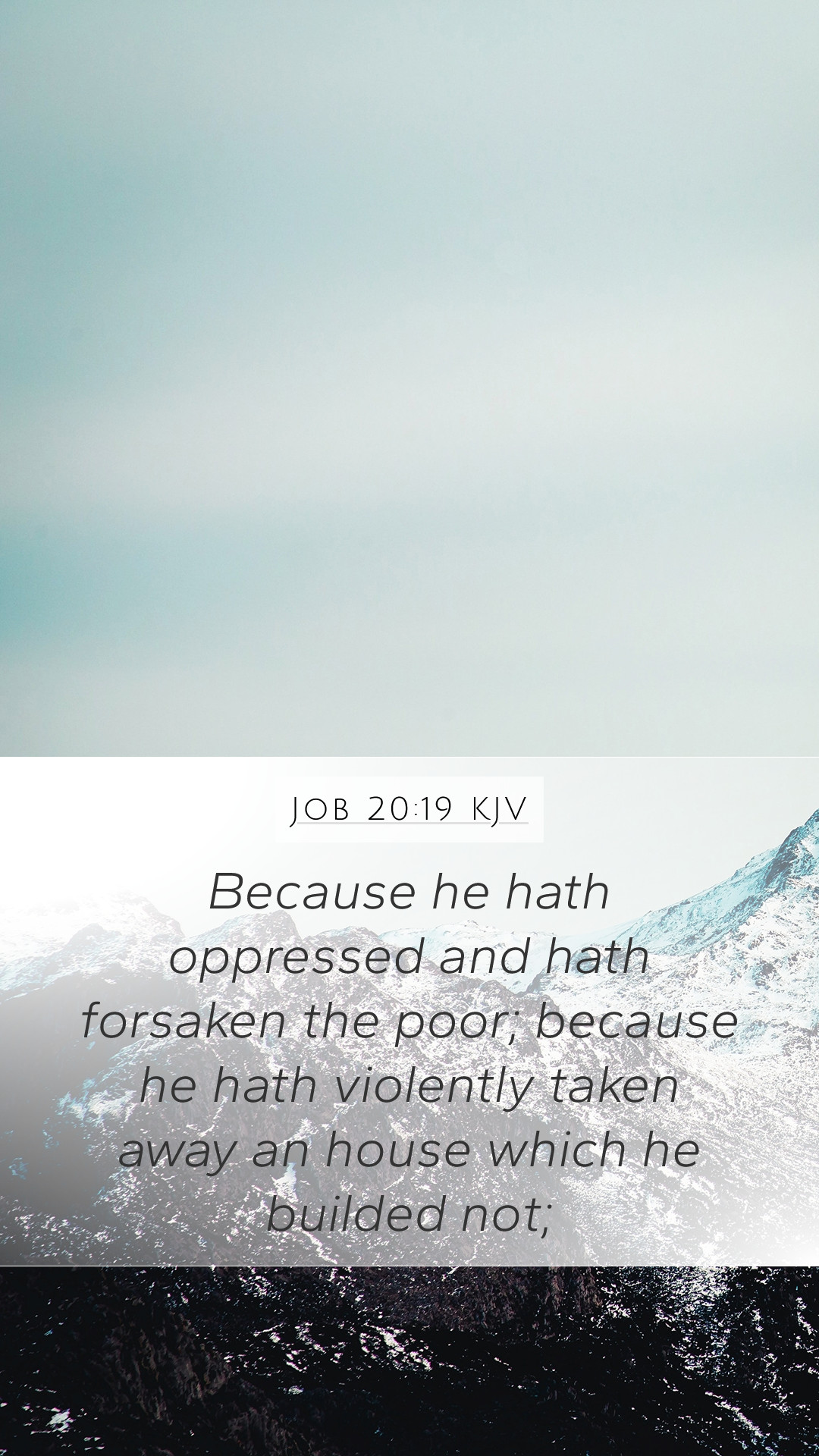Old Testament
Genesis Exodus Leviticus Numbers Deuteronomy Joshua Judges Ruth 1 Samuel 2 Samuel 1 Kings 2 Kings 1 Chronicles 2 Chronicles Ezra Nehemiah Esther Job Psalms Proverbs Ecclesiastes Song of Solomon Isaiah Jeremiah Lamentations Ezekiel Daniel Hosea Joel Amos Obadiah Jonah Micah Nahum Habakkuk Zephaniah Haggai Zechariah MalachiJob 20:19 Meaning
What is the meaning of Job 20:19?
Because he hath oppressed and hath forsaken the poor; because he hath violently taken away an house which he builded not;
Job 20:19 Bible Verse Meaning
Bible Verse Meaning: Job 20:19
Bible Verse: Job 20:19
In the context of the Book of Job, this verse is a part of Zophar's response to Job, emphasizing the temporary nature of the wicked's prosperity and the ultimate justice of God.
Summary of Insights from Public Domain Commentaries
-
Matthew Henry's Commentary:
Henry highlights that Job 20:19 reflects on the moral accountability of individuals, particularly the rich who exploit and oppress others. He emphasizes that such actions will lead to divine retribution, illustrating the principle that what is gained through injustice will not endure. The verse serves as a warning about the fleeting nature of material gain achieved dishonestly.
-
Albert Barnes' Notes:
Barnes interprets Job 20:19 by underscoring the connection between how one treats others, particularly those vulnerable and in need, and the consequences that follow. He argues that God’s justice is unavoidable, and those who practice betrayal against others, especially when they are in a position of power, will ultimately face judgment for their actions.
-
Adam Clarke's Commentary:
Clarke discusses the themes of justice and recompense in Job 20:19, noting that the verse encapsulates a broader theological idea where God will not allow the wicked to go unpunished. He expands on the notion of divine justice through suffering, emphasizing that the actions of the wicked have repercussions that extend beyond their earthly existence.
Meaning and Interpretations
The verse offers deep Bible verse meanings and Bible verse interpretations related to justice and retribution. It encapsulates a significant theme throughout the scriptures: God's unwavering justice and the eventual fall of those who act in wickedness.
Key Themes in Job 20:19
- Divine Justice: The verse emphasizes that God ensures justice prevails, and those who commit wrongdoing will ultimately be held accountable.
- Consequences of Actions: Zophar’s proclamation serves as a reminder that actions have consequences, especially when they involve exploitation and betrayal.
- Temporal Gain vs. Eternal Justice: The fleeting nature of worldly wealth is contrasted with the everlasting principles of divine judgment.
Application for Today
Understanding Job 20:19 is crucial for Bible study insights and Bible study lessons. Believers are encouraged to reflect on their dealings with others and the importance of righteousness over material gain.
Practical Applications
- Self-Reflection: Individuals should assess their actions and ensure they align with God's principles of justice and mercy.
- Community Ethics: The verse calls for a societal shift towards compassion, particularly towards the vulnerable.
- Long-term Perspective: Recognizing that earthly success without integrity is temporary, Christians are urged to focus on lasting values.
Cross References
- Psalm 73:18-19 - The end of the wicked.
- Proverbs 21:6 - The futility of gain from deceit.
- Isaiah 3:11 - Reward for the righteous and punishment for the wicked.
Conclusion
Job 20:19 reminds us of the enduring nature of God’s justice and the importance of living ethically in all aspects of life. For those seeking Bible verse explanations, this verse underscores a vital truth that resonates throughout Scripture: righteousness prevails, and justice is inherent to God’s nature.


